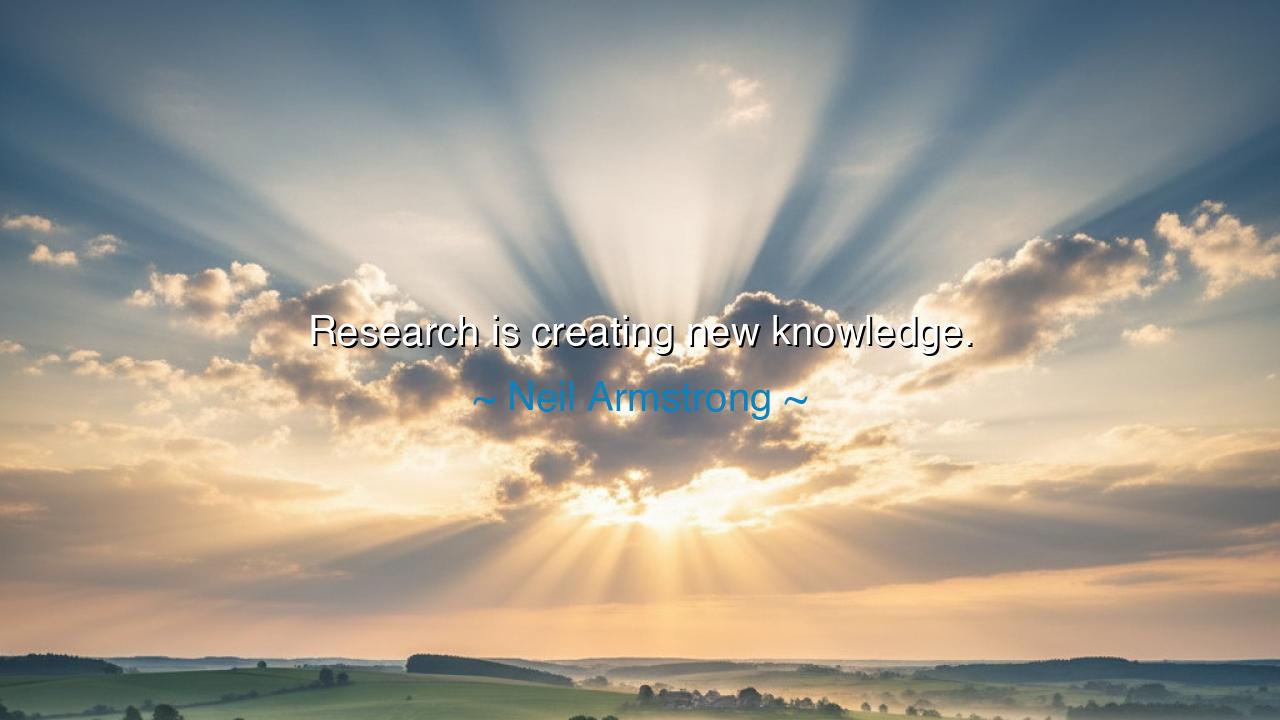
Research is creating new knowledge.






In the words of Neil Armstrong, “Research is creating new knowledge.” This phrase is not merely a statement, but a torch held high for all who dare to venture into the unknown. It calls to the hearts of seekers, dreamers, and wanderers of the mind, declaring that knowledge is not a static gift bestowed by the heavens, but a treasure unearthed by human courage. The ancients gazed at the stars and wondered; the modern soul gazes at mysteries yet unseen and begins the sacred task of discovery. For to research is not to wander aimlessly—it is to carve paths through forests of ignorance, to bring forth light where before there was only shadow.
Consider the weight of this truth: every great advance of humankind was once a fragment of thought, a spark of curiosity, a whisper from the unknown urging someone to look closer. The pyramids of Egypt, the voyages of Odysseus, the star maps of the Mayans—all were born of a hunger to grasp what was hidden. Yet Armstrong himself, the first man to step upon the lunar soil, knew better than most the journey from question to knowledge. He stood upon the Moon because countless minds had dared to pursue research not as a task of repetition, but as an act of creation.
To say “research is creating new knowledge” is to remind us that true wisdom is not inherited like an old heirloom. It is forged. It is built through trial and error, through failure that gives way to triumph, through courage that outlasts despair. Just as the smith tempers steel with fire and hammer, so too does the seeker of truth temper understanding through discipline and curiosity. The ancients spoke of Prometheus who brought fire from the gods; so too do the researchers bring forth knowledge, kindling fires that illuminate entire generations.
Let us look to a tale of modern times: when Marie Curie labored in her dim laboratory, sifting through pitchblende for years, she was not merely experimenting—she was creating new knowledge. Her body bore the cost, her nights were long and lonely, but from her perseverance came the revelation of radioactivity, a discovery that transformed science and medicine forever. She had not merely uncovered what was already known; she had called forth what had never before been imagined. That is the essence of Armstrong’s words—the act of research is an act of creation, an act of birthing into the world truths that never before had form.
There is heroism in this path. For the one who researches walks between humility and daring—humility to accept ignorance, daring to wrestle with it. The fruits of their labor are not always for themselves, but for the countless others who will stand upon their shoulders. When Armstrong spoke, he spoke not only as an astronaut but as a representative of centuries of inquiry, the culmination of mathematicians, engineers, dreamers, and thinkers who all dared to build bridges from what was known to what was possible.
Thus, the lesson is clear: if you wish to honor this truth, you must learn to embrace the unknown. Do not fear confusion, for confusion is the soil in which clarity blooms. Do not resist questions, for they are doors to hidden chambers of wisdom. Seek always to add to the tapestry of human knowledge, not merely to repeat what has been told. For in each act of inquiry, no matter how small, you participate in the eternal act of creation.
What then should one do? Begin with curiosity. Let your daily life be infused with the spirit of the seeker. Ask why, ask how, ask what lies beyond. Read widely, test boldly, and record faithfully the truths you uncover. Share them, so that others may build upon them, just as Armstrong’s step on the Moon was built upon centuries of discovery. Do not measure your worth by the grandeur of your findings, but by the sincerity of your search.
For in the end, to research is not merely to learn—it is to create. And in creating, you join hands with all who came before, and all who will follow. Like Armstrong stepping onto that silent gray dust, each small step you take in pursuit of new knowledge is a giant leap for humankind.






AAdministratorAdministrator
Welcome, honored guests. Please leave a comment, we will respond soon